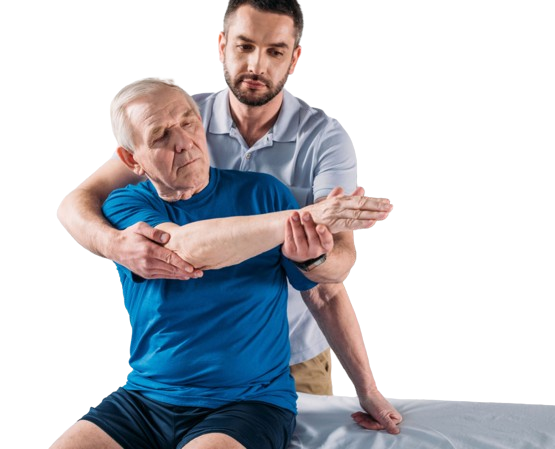Neurological Physiotherapy Expert in Perumbakkam
Your Trusted Partner in Neurological Physiotherapy
A neurophysiotherapist assesses and treats people with neurological conditions. We are here to provide you with top-notch care and guidance to tackle your problems.

Understanding Neurological Physiotherapy
Neurological Disorders and Diseases
Our physiotherapists see a huge range of disorders and diseases in patients. Some of the more common disorders we see include:
- Head injury
- Spinal cord injury
- Tumors of the central nervous system
- Spinal surgery
- Stroke
- Multiple Sclerosis
- Guillain barre syndrome
- Parkinson’s disease
- polyneuropathies
- Motor Neurone Disease
- Muscular Dystrophy
- Functional Neurological Disorders
What to expect from a physiotherapy session?
Assessment: we carry out a full initial physical assessment and get detailed information about your medical history, previous mobility and body function, personal and social situation. This helps to decide a patient’s individual needs and goals, and create a treatment plan.
Treatment: treatment is centred on a your individual needs. We encourage people to manage themselves, and involve family/careers in the treatment. We work with other professionals and use specialised treatment techniques to help you achieve the best level of function possible and offer advice, support and help to solve problems for every patient.
Equipment: After assessment, we can provide equipment such as walking aids and splints. We can refer patients to specialist services for wheelchairs, orthotics (such as braces, corsets, collars) and occupational therapy for splints and equipment to help with day-to-day activities.
Discharge and follow-up: we work with local and regional services, other hospitals and specialist teams so that patients who need further care can receive it when discharged from hospital.
Key Components of Neurological Physiotherapy
Mobility and Walking Training: Exercises and activities aim to improve walking abilities, balance, and coordination. This may involve practicing specific gait patterns, use of assistive devices, and addressing any associated challenges.
Strength and Endurance Training: Targeted exercises help build and maintain muscle strength, addressing weakness commonly seen in neurological conditions. The focus is on enhancing endurance to support daily activities.
Coordination and Motor Control: Activities that enhance coordination and motor control are integrated into the treatment plan. This can include tasks like reaching, grasping, and fine motor activities.
Balance Training: Balance exercises are crucial, as many neurological conditions can affect balance. Therapists employ various techniques and equipment to improve postural control and stability.
Functional Activities: Emphasis is placed on practicing functional activities relevant to the individual’s daily life. This may involve tasks such as dressing, cooking, or getting in and out of bed.
Pain Management: For individuals experiencing pain related to their neurological condition, physiotherapists use various modalities and techniques to manage and alleviate pain.
Benefits of Neurological Physiotherapy
Improved Mobility: By addressing specific impairments and focusing on mobility training, individuals often experience improvements in their ability to move and perform daily activities.
Enhanced Independence: Neurological physiotherapy aims to enhance independence in daily tasks, promoting a sense of autonomy and improved quality of life.
Prevention of Secondary Complications: Physiotherapy helps prevent secondary complications such as muscle contractures, joint stiffness, and pressure sores, which may arise due to immobility.
Optimized Function: Through targeted interventions, individuals can achieve optimal physical function, adapting to their abilities and maximizing their potential for participation in daily life.
Emotional and Psychological Well-being: Improved physical function often positively impacts emotional well-being, fostering a sense of accomplishment and confidence.
Frequently Asked Question on Neurological Physiotherapy
Neurological physiotherapy is a specialized branch of physical therapy that focuses on the assessment and treatment of individuals with neurological conditions affecting the central nervous system, including the brain and spinal cord.
Neurological physiotherapy addresses conditions such as stroke, traumatic brain injury, spinal cord injury, multiple sclerosis, Parkinson’s disease, and peripheral neuropathies.
Yes, physiotherapists use various modalities and techniques to address pain associated with neurological conditions, aiming to manage and alleviate discomfort.
Neurological physiotherapy can benefit individuals of all ages, from children to older adults, depending on the specific neurological condition and individual needs.
Coverage varies, but many insurance plans cover neurological physiotherapy, especially when prescribed by a healthcare provider as part of a treatment plan. It‘s advisable to check with the insurance provider for details.
Individuals with neurological conditions or those experiencing challenges with mobility, coordination, or daily activities should consider neurological physiotherapy. It is particularly beneficial after a neurological event such as a stroke or brain injury.
Session duration can vary, but a typical neurological physiotherapy session may last between 30 to 60 minutes, allowing sufficient time for a comprehensive treatment.
